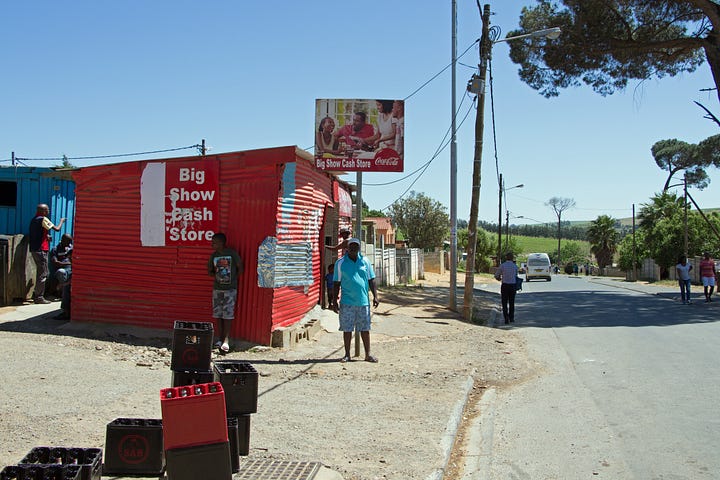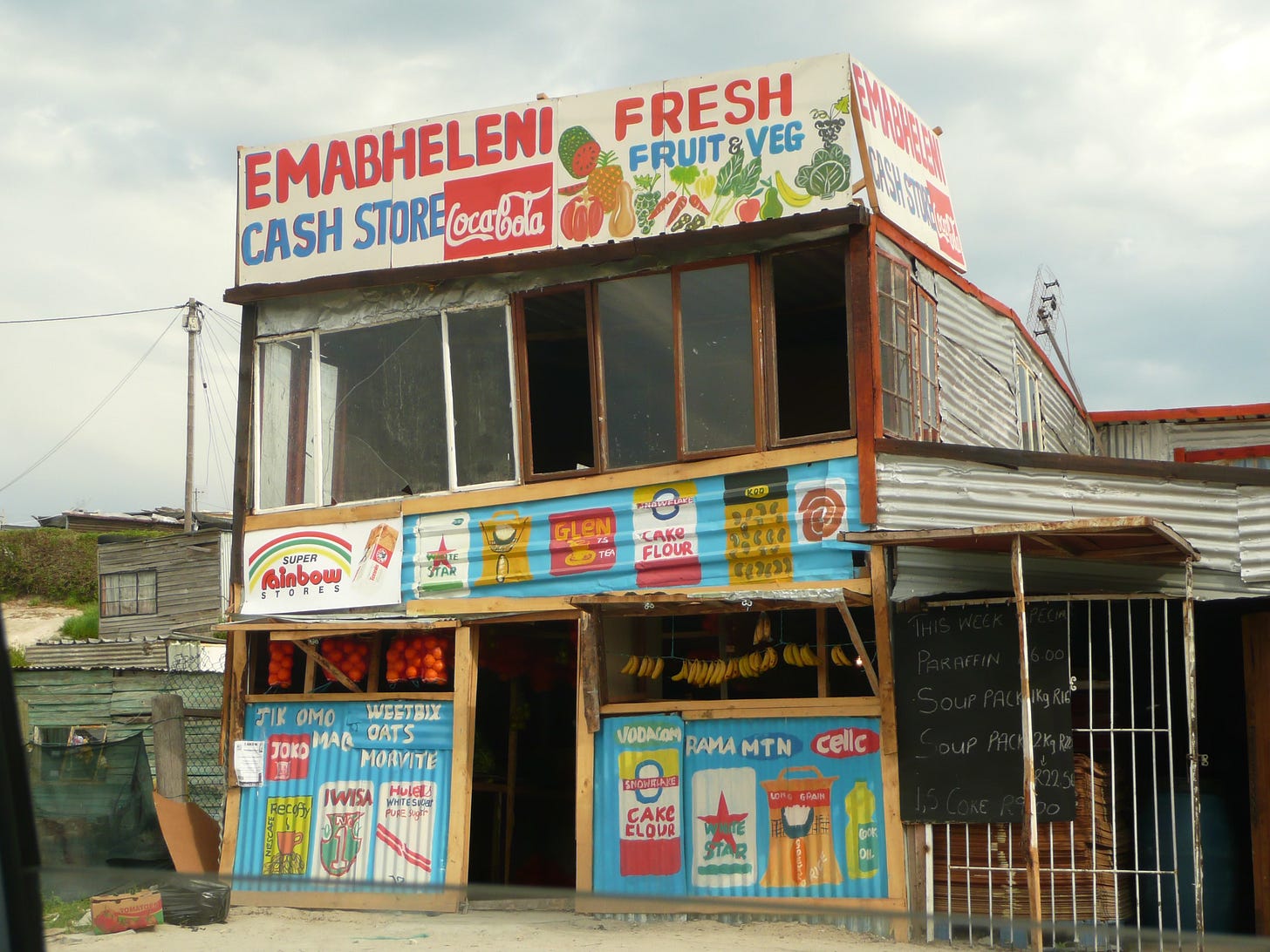The Spaza Shop Poisonings
Who was responsible for a spate of food poisonings in South Africa: small local shops or Big Ag? Words by Tsitsi Bhobo and Winile Ximba.
Good morning, and welcome to Vittles! Today, Tsitsi Bhobo and Winile Ximba report on an epidemic of poisonings linked to pesticide-contaminated snacks in South Africa’s poor Black townships that has shone a light on vast inequalities in food security and anti-migrant tensions.
There are still a few copies of Issue 1 left – to buy it, please visit our website.
In September of last year, Sophie Zikho’s nine-year-old son, Thato, ate a packet of bright orange muffins – a cheap, widely available snack that he had enjoyed many times before. Within three hours, he was rushed to hospital for emergency stomach surgery. Although the situation was initially touch and go, he was discharged three weeks later, weak and pale but alive. Thato still experiences headaches, and his lung and kidney function are being monitored regularly. Nevertheless, Sophie is ‘still extremely thankful, even to this day’.
Sophie and her two children live in Soweto Township in the west of Johannesburg, in a cramped, two-room shack made of recycled zinc. The kitchen – which also functions as the bedroom – is lined with pots, a paraffin stove, and dishes. Their makeshift home is typical of the poorer informal structures that exist alongside the state-provided red brick houses in Soweto, which, with a population of 1.3 million mostly Black South Africans, is South Africa’s largest township (the term ‘township’ generally describes the poor suburbs on the outskirts of big cities).
Since July 2024, Soweto has been at the centre of an epidemic of deaths and illnesses, which to date has killed at least twenty-three children and affected thousands of people. Severe stomach cramps, vomiting, dry mouths and high fever were the symptoms reported in the majority of victims. When doctors interviewed Thato and other kids who recovered from the illness, they blamed spaza (or spazza) shops, the slang name for the estimated 150,000 small corner stores that have long been embedded in low-income townships and informal settlements in South Africa, which often operate from remodelled home garages or backrooms. Although they are generally unlicensed, spaza shops have a dedicated client base in townships and informal settlements because of their low prices and a willingness to advance credit lines for groceries based on community trust. They are also far more convenient – Sophie’s nearest spaza shop is within a hundred metres of her home and has no strict operating hours, whereas all the big corporate supermarkets are miles away, in shopping malls. Additionally, spaza shops often repackage items for their clientele – for example, a loaf of bread that would be sold as a whole in a big supermarket might be repackaged into small portions so that even the poorest customers in townships can afford it.
While Sophie frequents several spazas in Soweto, it was from the shop she visited most often that she bought the muffins linked to Thato’s illness. ‘I loved them all my life,’ Sophie says, ‘[but] I don’t know what to think of spaza shops, the owners, and their food anymore.’ She is not alone in her confusion. As the deaths and illnesses proliferated, ugly rumours began to circulate, amplified by social media. Angry citizens took to the streets, accusing the shops of selling ‘killer snacks’ and demanding that they be shut down. Conspiracy theories quickly spread. Bandle Donga – a self-styled ‘super-patriot’ with Operation Dudula, South Africa’s best-known xenophobic militia group – accused spaza owners accused of intentionally using ‘toxic chemicals to stretch the freshness of their foodstuffs’ and ‘throwing cocaine powder into fake Coca-Cola fizzy drinks to destabilize our youths’.
The narrative surrounding spaza shops is further complicated by the status of spaza shop owners, many of whom are refugees or undocumented immigrants from Pakistan, Bangladesh, and Yemen. Well before the outbreak, xenophobic locals were already threatening the safety of migrant food shop owners, accusing them of stealing local jobs, overwhelming public services meant for South African citizens, and being drug lords out to spoil local kids. ‘The food-borne illnesses simply further inflamed hostility around a targeted minority,’ Zwelinzima Vavi, a veteran trade unionist and rights advocate, tells us. The spate of poisonings led to vigilante violence. ‘We were hunted like rabbits,’ says Mustafa Bullah, a Pakistani asylum seeker who ran a spaza shop in Soweto until October, when a mob burned his merchandise. Mustafa, fearing his and his family’s safety, agreed to speak to us only if we changed his name. He has since moved to Cape Town.
Because they are embedded in the community, and are generally run by migrants who are already targets of xenophobic hatred, it has been easy to pin the blame for the poisonings on spaza shops. Yet soon it would become clear that the origins of the epidemic were much broader, with spazas just one piece of a larger picture that encompasses ongoing failures of municipal management by local government, poor regulation of Big Agriculture, and black-market traders.


Last November, well after reactionaries had lain the blame for the poisonings with spaza shops, the South African National Institute for Communicable Diseases published analysis suggesting that the cause of the epidemic was contamination with the pesticides terbufos and aldicarb. Aldicarb use is illegal in South Africa, while the use of terbufos, which is banned in dozens of countries due to its extreme toxicity, is highly restricted. However, both are commonly used in South Africa’s vast commercial farming sector. Evidence suggests that the pesticides are being illegally diverted into low-income areas to control the deepening urban rat infestation crisis, which has been inflicting ‘severe distress’ on residents in townships and informal settlements across South Africa and, according to former leftist lawmaker Fana Mokoena, ‘menacing lives at the household and business level’.
The burgeoning rat infestation is secondary to a broader wave of dysfunctionality – water shortages, rolling power cuts, open sewers, and hills of uncollected trash – a result of the deepening corrupt governance which is crippling South Africa’s cities and towns. As Paula Knipe, a researcher at the Dullah Omar Institute in Cape Town, explains, these ‘mountains of uncollected trash create perfect breeding grounds for rats, which thrive on discarded food scraps.’
‘The rats are not afraid of people,’ explains Jonga Molewe, a grandmother living in Naledi, Soweto. ‘They bite from the evening, forage for food pots, crawl from sewer pools to bedrooms, and scare even small dogs.’ But municipalities have done ‘absolutely nothing’ in Soweto to control the rat infestations, she adds. The infestation has proved resistant to attempts at containment with more readily available licensed pesticides. In desperation, people have reached for alternatives from the booming black market. Teko (not his real name), who goes by ‘Bossman’, is a street dealer in Durban who sells drugs and anything that can be commodified. He claims that it’s easy to bribe agriculture workers, chemist employees, and warehouse clerks to procure terbufos, which can then be lucratively resold to households and informal food sellers. ‘It’s simply a “Name your price”, and a deal pops,’ he tells us.
As Patricia Forbes, an environmental chemist at the University of Pretoria, explained to Chemistry World, when agricultural pesticides are informally sold in this manner, they ‘have been decanted into unlabelled packages [and] therefore customers are not provided with essential handling and safety information’. Often people do not know which pesticide they’re buying or how to use it, which poses massive risks to human health (terbufos and aldicarb can bedangerous if swallowed, and if even small amounts come into contact with the skin).
The National Institute for Communicable Diseases concluded that these deadly pesticides have infiltrated streets and informal markets – especially warehouses, where rats raid stored food. So, food comes into contact with the pesticides before distribution to the spaza shops, who simply sell the food on to the final consumer without any knowledge of the contamination. Yet because the warehouses – like the spaza shops themselves – are also informal, unregistered, and often hidden from state regulators, no warehouse owner has been prosecuted (perhaps not surprising – there is widespread corruption and weak state enforcement capacity, despite the occasional highly publicised raid). Tommy Mthombeni, the police commander for Gauteng Province (in which Soweto Township is located), also told us that it’s difficult to confirm ‘how exactly these pesticides filtered into street markets, and who was behind the breaches’.
Meanwhile, community focus has remained on the spaza shops. Spaza owners, already reviled by xenophobic groups, are low-hanging fruit. Mustafa, the migrant shop owner, emphasises that spaza shop owners are victims in this, too. ‘How can we possibly know whether the rat poison contaminated the food chain at the warehouse stage or in spaza shops?’ he asks. ‘It’s the agriculture ministry that must answer why restricted pesticides are leaking’.
The government, however, seems happy to use spaza shops as very easy scapegoats, playing to populist anti-immigrant sentiment to distract from their own failure to regulate informal warehouse food supplies and pesticide use – or, indeed, to address the infrastructural problems that necessitate the widespread use of deadly poisons. In December, the government instructed all spaza shops to register on a government database and thus obtain licences, but according to Themba Godi, an outspoken opposition lawmaker and leader of parliament’s portfolio on trade and industry, the process was underfunded and chaotic. ‘Without clear targets, the registration drive could end up as vibes and little substance,’ he says. ‘Numerous spaza shop owners have called me complaining that the paperwork is confusing, and some dodgy inspectors are demanding bribes to overlook non-compliant corner stores.’ Stella Ndabeni-Abrahams, the small businesses minister, vowed that any officers demanding bribes from shop owners would be ‘prosecuted and punished swiftly’, but admitted in March that just sixty of the total 257 municipalities across South Africa possessed the digital database infrastructure to enable registration of spazas. The total number of shops that have been registered to date is not known, but the government claimed in December that more than ten thousand had submitted applications.
It is significant that the poisonings have largely been confined to informal settlements and townships – and, by extension, Black South Africans rather than wealthy white populations. Soweto, where the epidemic has been concentrated, developed as a township as a direct result of the forcible relocation of Johannesburg’s Black residents in the colonial era. Black lands were grabbed to build white-only neighbourhoods, and the township remains an emblem of the highly racialised city demographics that define one of the world’s most unequal countries. Even though South Africa is considered a ‘wealthy’ African country and food secure at a national level, this world-class ‘food production security’ is often geared towards lucrative export markets like the UK and Germany, Paula explains. It does not translate into household food security, particularly in Black working-class and low-income communities (as of 2020, some 24% of the population still lived in informal settlements).
While the middle and upper-middle classes, who are mostly concentrated in suburbs and city centres, have access to regulated, high-quality food from clean, temperature-controlled corporate supermarkets like Woolworths or Checkers (part of the Shoprite chain), low-income residents of townships and informal settlements have little choice but to rely on spaza shops, where food is often not clearly labelled and lacks expiration dates. ‘We buy our meal ingredients – macaroni, soda, dry milk – without checking expiry dates because that’s what our little money can afford,’ Sophie tells us.
Food prices in South Africa are rising faster than wages, pushing more and more people towards the cheapest food options, regardless of how safe they are. In the March budget, the Minister of Finance announced a 1% VAT increase over the next two years; this will disproportionately impact low-income households, pushing them into further despair. In this context, levels of malnutrition and reliance on informal food economies and cheap, low-quality ingredients are likely to increase even more.
For the most part, the government’s food safety enforcement efforts remain focused on formal markets, while informal vendors and small township stores go unchecked. Yet even within the formal market, corporate regulation can be weak, Paula says. She points to the 2017–18 listeriosis outbreak that killed over 200 people in South Africa, which was eventually traced back to big food corp Tiger Brands’ polony, a processed meat product that’s a staple even in many low-income households. The company ‘was slow to take responsibility and quietly paid fines, escaping all real consequences,’ Paula says.
This is why people like Sophie are deeply sceptical of the government’s sudden spring to demand that spaza shop traders register on their database. ‘It’s hot air without targeting the informal warehouses and corrupt sellers of pesticides in Big Agriculture,’ she says. But again she emphasises that it makes little difference – irrespective, she has little choice but to continue using spaza shops. ‘Licensed big supermarkets won’t even entertain our situation.’
Paula agrees that the database alone will do little to change things. Without stronger regulation of the food industry overall, municipal investment, corporate accountability, and economic transformation that ultimately makes healthy, safe food more affordable and accessible, ‘the cycle of food inequality and preventable diet-related deaths will continue,’ she says.
The reported deaths and illnesses have largely slowed since the cause of the outbreak was identified back in November (although there is no evidence to suggest that people have stopped using pesticides). The xenophobic targeting of spaza owners has also calmed down a little since the government’s registration PR stunt. Though some spaza shops have remained shut, the majority are still operating – in poor townships, there are few alternatives for residents who want quick and cheap supplies. However, hostility toward migrant grocer shop owners remains firmly intact. ‘We have uneasy peace,’ Mustafa tells us. ‘We learnt via our WhatsApp group that vigilantes in Soweto are saying that if displaced migrant shop owners return and reopen spaza shops, they’ll face the “unknown”.’
Credits
Tsitsi Bhobo is a freelance journalist in Southern Africa covering renewable energy, vaccine treatable diseases, the effects of the climate emergency, and human rights. Her work appears in GAVI News, Earth Island Journal, The Goat Pol, and The Xylom.
Winile Ximba is a freelance journalist in Southern Africa. Her work appears in Premier Christianity Magazine, Rewilding Magazine, and Planeta Futuro.
The full Vittles masthead can be found here.






Thanks for this piece. This is why I subscribe - food as a jumping off point into great insightful journalism.
this sort of reporting is why I subscribe, thank you